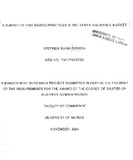| dc.contributor.author | Githiga, Stephen M | |
| dc.date.accessioned | 2013-05-12T11:02:06Z | |
| dc.date.available | 2013-05-12T11:02:06Z | |
| dc.date.issued | 2004-11 | |
| dc.identifier.citation | Masters Of Business Administration (MBA) Degree, University of Nairobi | en |
| dc.identifier.uri | http://erepository.uonbi.ac.ke:8080/xmlui/handle/123456789/22442 | |
| dc.description | A Management Research Project submitted in
partial fulfillment of the requirements of the
Master of Business Administration Degree | en |
| dc.description.abstract | Insurance rate making is the process of establishing a premium rate for a particular
class of insurance. The rate is the price of a unit of insurance. The premium, say for a
particular building, is arrived at by multiplying the sum insured i.e. amount of insurance
coverage by the premium rate.
Adequate rating is essential if profitable business is to be written. In a competitive
market the price of insurance like that of other services is to a large extent determined
by forces of demand and supply. With too many operators on the supply side there is a
danger the price might not be right.
This study set out to establish the perils and factors that affect rating of fire insurance
and the practices adopted by insurance firms underwriting fire risks in a competitive
environment.
A survey was therefore carried out so as to meet the objectives of the study. The main
objectives of the study were to identify factors considered during fire rating and the
practices adopted by insurance firms to cope with competition.
The survey was carried out among all insurance companies who underwrite general
business including fire. Questionnaires with both open and closed ended questions
were used to collect data.
The main findings of the survey are that fire rating is affected to a very large extent by
explosion perils, earthquake perils, storm and flood perils, collision and impact perils,
riot and strike perils, subsidence and ground heave perils and malicious acts perils. The
findings also revealed that the industry has suffered substantial losses totaling to over
4.7 billion shillings in the last decade as a result of fire and that fire rating practices are
not standardized.
In the light of these findings it is recommended that the industry formulates generally
accepted fire rating guidelines and sensitizes its clients on the benefits of good
housekeeping so as to minimize risks and hence avoid huge claims resulting from fires. | en |
| dc.language.iso | en | en |
| dc.publisher | University of Nairobi | en |
| dc.title | A survey of fire rating practices in the Kenya insurance market | en |
| dc.type | Thesis | en |
| local.publisher | School of Business | en |

